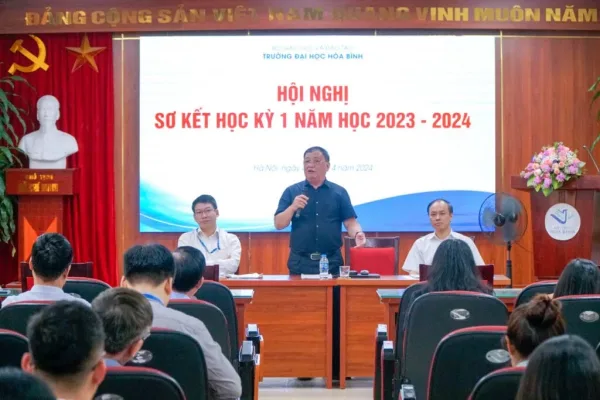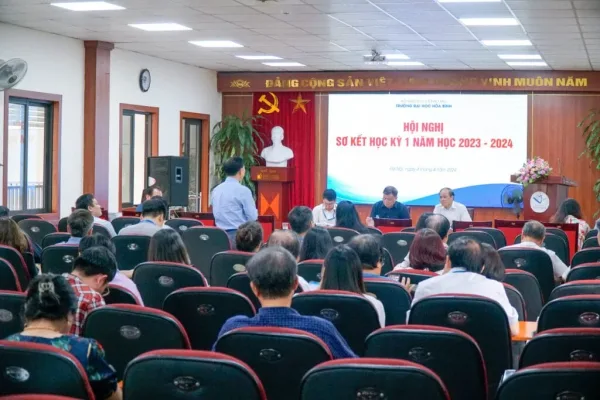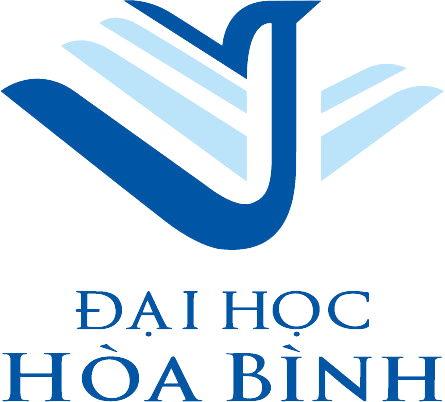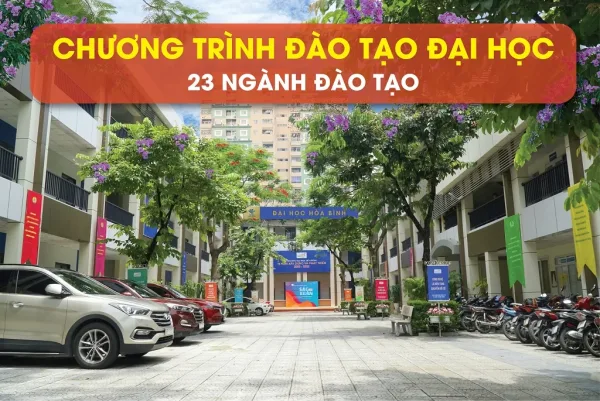Hoa Binh University’s Training Review Conference for the first semester of the academic year 2023-2024
On the morning of April 4, 2024, Hoa Binh University held a conference to review the educational activities and training progress of the first semester, and to continue implementing the training plan for the second semester of the academic year 2023-2024. The conference was attended by the university’s leadership team, heads of departments/units/institutes/centers, as well as a large number of faculty members.

During the conference, Mr. Dương Văn Bá, Deputy Head of the Department of Training and Academic Affairs, presented a summary report on the first semester. In this period, the university assessed various aspects of the training plan implementation, including: evaluating the execution of teaching plans and processes by lecturers, organizing and managing classroom activities; innovating teaching methods, linking theory with practice, updating assessment methods based on learning outcomes; reviewing guest lecturer procedures, managing visiting lecturers’ expertise; assessing lecturers’ involvement in student management and advising, fulfilling mentoring responsibilities as required; evaluating student learning progress; assessing the adequacy of facilities, equipment, and library resources for teaching and learning; evaluating exam question bank development, exam preparation, and exam quality; evaluating exam invigilation, grading, and grade submission at the end of the course.

The report highlighted significant positive developments in the educational and training activities of the university during the first semester of the academic year 2023-2024, successfully completing routine and unexpected tasks, with outstanding achievements in various areas: effective leadership and management, flexible and responsive training plans tailored to the context and circumstances; successful development and implementation of training programs; conducting training workshops for all staff and faculty on “Inspiring Teaching Methods”; participating in regular inspections of teaching and learning regulations; proactive and responsible core faculty members actively managing students in and out of the classroom, organizing extracurricular activities for students; improving and investing in teaching facilities, equipment, libraries, laboratories, and overall training resources; initial establishment of a question bank for all courses in the first semester and adherence to regulations, ensuring quality in exam organization, preparation, and grading; ongoing improvements to meet quality assurance standards in education. However, there are still limitations that will be addressed through ongoing learning and improvement efforts.
In his address at the conference, Assoc. Prof. Dr. To Ngoc Hung commended and acknowledged the achievements of the past semester, emphasizing the need for further collaboration among departments and faculty members within the university. He stressed the importance of refining the training program, overcoming challenges and limitations, and proposing measures to enhance the quality of education and training within the institution.
During the conference, the university leadership listened to and considered the valuable contributions and suggestions from faculty members across departments and units, fostering a collaborative spirit aimed at driving continuous improvements in the future.
The conference also approved key tasks in education and training for the second semester, including: refining regulations, procedures, and policies in training management; developing and implementing training plans; enhancing the credit-based training management software; intensifying efforts to recruit guest lecturers and supplement the core faculty team; directing departments and faculty members to improve existing tasks from the first semester and complete teaching documents for the second semester; adjusting, updating, and managing training programs; monitoring lesson plans, lectures, and teaching methods of faculty members; adapting teaching methods to suit student learning conditions; coordinating teaching observation sessions with the Educational Quality Assurance Department and Academic Affairs Office to monitor training plan implementation and teaching quality; expediting construction, repairs, and improvements to facilities to meet effective teaching and learning requirements; strengthening connections and collaborations with local and international partners of departments and the university to jointly organize training activities, practical training, internships, and support student employment opportunities.







